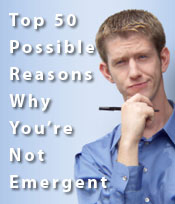
On Saturday night I was watching the Presidential debates and I made one of the more significant decisions of my life. I chose to go with Barack Obama. And believe me, this decision was not an easy one. It came the moment I joined the Support Obama page in my Facebook account. I remember the moment before pressing it and saying, “Do you know what you are doing?”
I’ve always been a lifelong Republican. I can’t honestly remember voting for a Democrat in my lifetime, although I’m not overtly political over the last ten years. I think much of this has to do with the home I grew up in, which was always Republican. We didn’t really have very many conversations about it. Its just the way it was, never questioned.
And I realize now that this decision has been a lifetime in coming. I can’t honestly say what it was that swayed me. I know that is had to do with growing up in the multicultural world of east side San Jose, CA. I know it had to do the frustrations I’ve had with Bush. I know it had to do with who Barack is. I know it has to do with the significance of his race as part of history. I know it has to do with my desire to take part in something that will change the world. Each of these reasons is significant.
The reality is that our world is now multicultural. In some respects we are behind the times in this regard. We haven’t led the world in breaking the glass ceiling in regard to race and gender issues. We haven’t come to grips with the fact that we are no longer simply a European nation, with a few other people. Hurrican Katrina was a clear example that race still matters to some people. And every time I think we’ve gotten past the “gender” thing, something new pops up. What are we so afraid of? I’ve actually talked to people who still would not consider a woman for President.
And to be honest, I’m emotionally tired with Republican leadership. It’s exhausting. I look at Bush and see a man who is disconnected from reality. And it’s not just me. His disapproval rating is the lowest since Nixon. The war has taken a toll that cannot be counted, and I’ve just had enough. I guess I just refuse to be taken for granted anymore.
So when Barack comes along, he doesn’t just represent an opportunity to vote for change. We’ve heard enough of that word. We’re looking for someone who gets the problem, not the rhetoric. And the problem is that the American people are simply willing to accept the problem. Change is really hard. One of the significant things that has shown up for me is Barack’s willingness to tell the public that they have to join the change. He’s not interested in doing it for us. His website even has the following quote, which I think is progressive,
“I’m asking you to believe. Not just in my ability to bring about real change in Washington…I’m asking you to believe in yours.”
That’s awesome. It reminds me of JFK’s speech. “Ask not what your country can do for you but what you can do for your country.” It takes a lot of character, guts and maturity to realize that a leader cannot do it on his own. Barak is inviting the people into the process and that is good. But that process requires us to sacrifice.
Voting for Barack, for me, is also somewhat like taking part in MLK’s picket lines. It’s a once in a lifetime opportunity for Americans. We have the opportunity to tell the world race no longer matters in American history. We have the opportunity to tell the world that we really, really, really do believe that each of us is created equal and to essentially break one of the last glass ceilings. I dig that and want to take part in that.
And I’m not just voting for Barack because he’s African American. He’s technically of mixed race. I’m voting for him because he’s is the one who has the best vision AND the ability to inspire that in people. No other candidate did that for me during the debates. I never got the sense that Barack is doing this for himself. And that to me is one of the central qualities of great leadership. And when a leader is doing it WITH the people, great things can happen. His best quote on Saturday was,
“I think the American people are hungry for something different and can be mobilized around big changes, not incremental changes, not small changes.”
You can see the video here. So that’s why I’m voting for Obama. What about you?
PS: A follow up post that hopefully answers some of the questions in the comments can be found here.
Read Full Post »
 Recently I did an extensive two part book review on Phyllis Tickle’s, The Great Emergence. The book is in my opinion one of the most important books for understanding the larger framework that is going on in the evangelical and even larger Christian context.
Recently I did an extensive two part book review on Phyllis Tickle’s, The Great Emergence. The book is in my opinion one of the most important books for understanding the larger framework that is going on in the evangelical and even larger Christian context.













